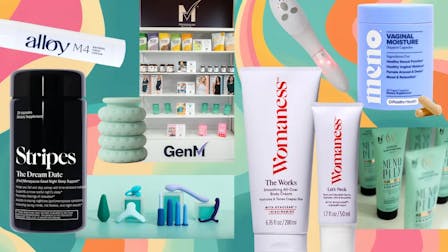Well Up: AI-powered beauty recommendations, reimagined menopause care and the rise of tech protective skincare
AI Is Hyper-Personalizing the Beauty Industry
The new RoC AI Skin Insight tool claims to be able to deliver “highly personalized and evolving skin care recommendations.”
First, the tool uses a mix of advanced machine learning algorithms and sophisticated image recognition to identify common skin concerns like pigmentation and fine lines. Then, it factors in the user’s existing routine and lifestyle to ensure “highly personalized and evolving skin care recommendations.”
Feedback gathered through other touch points (like in-app surveys) also helps ensure products are tailored to the user’s budget and desired look.
Unilever has also been investing heavily in AI beauty, including several recently launched diagnostic and personalization tools.
AI is making beauty shopping so personalized that, in August, Business Insider reported on a Stanford researcher who developed an AI tool that could accurately predict, “traits such as sexual preferences, political affiliations, and intelligence based on a person’s appearance.”

Will Millennials Fuel a New Kind of Menopause Care?
“Menopause deserves a rebrand,” Vogue Business decreed earlier this summer.
Many have tried, with Nutribloom Consulting linking menopause symptoms to changes in the microbiome, and Naomi Watts making headlines when her menopause care brand “Stripes” was acquired by LVMH.
But perhaps most importantly, last year, market research firm Grand View Research valued the menopause space at $17 billion globally — with a projected compound annual growth rate of 5.4% over the next six years.
Later in August, the founder of the (decentralized) women’s health research group Athena Dao said that, “women are willing to pay about $60,000 towards menopause products just to try to mitigate the symptoms,” and WWD finally broke down “What is Really Needed to Drive Sales for Menopause Brands.”
While there’s no one-size-fits all solution, the article shines renewed emphasis on industry standardization; including “education from a valid source,” universal symbols, home tests, attractive in-store retail, and even FDA-approved drugs.
Best of all, it suggests that because the category will boom as more millennials enter into perimenopause, there’s the possibility that ‘“the next generation won’t even have to worry about menopause” because it will be just like period care and puberty. Because as Colette Courtion, founder and chief executive officer of device brand Joylux, reminds us “It’s just a phase of life. Here are the tools, and this is how we deal with it.”

The Rise of Tech Protective Skincare
Tomorrow-Today Beauty recently launched an $81 “Tech Protect Serum.”
The release joins the ranks of Ware’s $65 Screencream and Ilia’s $38 Blue Light Mist, all of which claim some level of blue-light defense. Meanwhile, Tula’s ‘Blue Light Protection’ collection page displays its standard sunscreens and eye creams, and ingredients from other releases are often touted as both blue light and pollutant blocking — so what exactly is blue light protection?
Glossy explains that blue light is the spectrum of visible light with “a wavelength of 400-500 nanometers.” Our screens and the sun are its main sources, and so there is some crossover between products that promise sun and blue-light protection. However, “broad-spectrum SPFs are not required to offer protection from visible light” — and there is “little regulation around messaging about blue-light protection.”
So with growing concerns around the emotional toll tech may be taking on younger generations, consumers are already primed — and looking for — extra protections against technology’s negative effects. These latest releases now indicate that this desire for technological protection is informing beauty habits.

OTHER NOTEWORTHY HEADLINES
- AI Informed Robots are Set to Hit Some Equinox Gyms, so the NYT Tested One for Themselves
- Glossy explained the rise of the now-viral Yuka App
- Vogue just called Propolis Skincare’s ‘Buzziest Ingredient’
- New FIT Research has identified a $10 billion opportunity within Beauty Deserts